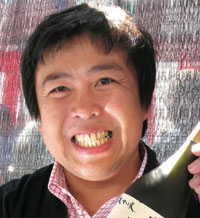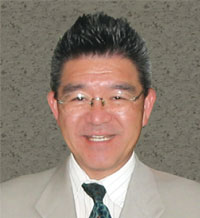“Peace Dining”, a pioneer of sustainable sushi An interview with Josh Onishi, President and CEO of Peace Dining Corporation
By Aya Ota
They say that the number of Japanese restaurants developing overseas has tripled in the past 10 years, and is reaching near 90,000 (*1). The popularity of Japanese cuisine never seems to decline. Sushi, in particular, seems to have settled into America’s dining scene; however, a big new wave of changes is also about to hit the shore.
“Just like the past transition of the phase after the mass production and consumption period in which you needed to take in healthy and organic elements in order to stay successful in the current business world, I am certain that you need to consider sustainability more importantly next,” says CEO/President Josh Onishi of “Peace Dining”. This company provides take-out sushi and ramen all over the US including 250 store locations of the Whole Foods Market chain under the “Genji” brand, and in about 50 other supermarkets and company cafeterias under the “Mai” brand.
The common principle of all of this company’s businesses is sustainability. They are the first sushi handling company that acquired ISO14001 in the United States. Then, in 2011, they realized 100% sustainable procurement of ingredients. They procure only the seafood which is certified by the third-party certification authorities as green or yellow grade, and therefore, the types of fish they can get is limited. The tuna this company uses is caught by the traditional single-hook handline fishing method. The current mainstream fishing methods are by longline, such as round haul netting or bottom trawl netting, which tend to lead to overfishing, bycatching, or destruction of the seabed environment. Realization of sustainable procurement of ingredients takes cost and labor, and is not easy. “At this point, as the reason for consumers to buy sushi, sustainability accounts for only less than 20%. However, it will be too late if we wait for another few years to take it seriously,” says Mr. Onishi. The top two largest supermarket chains in the US have already committed themselves to realize 100% sustainable procurement of seafood by 2020, and 2022 respectively. Presently, from the point of view in which the usable seafood is limited, it is possible for supermarkets to realize the procurement of sustainable sushi; however, general sushi restaurants still experience many issues in order to realize that. Nevertheless, the effect on the entire US consumer market from this movement, when nearly 6,000 supermarkets shift for it in a few years, would be so huge, and could surpass one’s imagination.
“Peace Dining” was formally operated as “Genji Sushi”, a small sushi restaurant in Philadelphia. “Genji” entered the Whole Foods Market chain as a sushi bar section in 1997, about 20 years ago. At that time, unlike now, supermarkets that had a sushi bar were very rare. Then, the “Genji” brand grew big very quickly, and the “Peace Dining” company acquired the Genji brand in 2005. Mr. Onishi took the position as Vice President in 2011, and then became President/CEO in 2015. Then, in 2016, the company joined “Hana Group” that develops Japanese cuisine in 11 countries globally in Europe and Asia.
While promoting sustainability, Mr. Onishi has also been aggressively pushing “Market-in”, which is the customer first concept. This company has a group specialized in R&D, which develops products always with customers’ voices in mind. It is not too much to say that their products, including not only sushi made with brown rice, but sushi with brown rice and quinoa or multigrain rice, sushi under 500kcal, vegetable-only vegan sushi, non-grain Paleolithic sushi, etc., are leading the trend of the entire US food industry. They introduce at least one new product a month, and among them, sushi called “AHIMI®” made with new 100% plant origin ingredients became a recent hot topic. Also in recent years, in addition to the sushi business, they began developing globally, the “Grocerant” business, in which restaurant-quality foods are offered, expanding their categories to include izakaya and ramen businesses, and other Asian cuisine besides Japanese.
“I intend to go to the side where rules and systems are made in the future,” says Onishi. Currently, regarding seafood, it is required to abide by the standards created by the third-party certification authorities. Moreover, there are still many kinds of Japan-caught fish that have not been certified by such authorities; which leaves a possibility that you will no longer be able to sell them in the US in the future. Mr. Onishi continues, “From now on, by aggressively getting involved in the side where rules and systems are made, I would like to keep supporting the efforts of having many more kinds of Japanese fish get certified.”
“Sustainable sushi―sushi with sustainable and natural ingredients that can contribute to people’s health, should grow bigger for the society. And I feel that it is my lifework as Japanese to promote that,” says Onishi. I cannot help but keep my eyes on their future development.
(*1) In a 2015 report by the Ministry of Foreign Affairs, and an estimate by the Ministry of Agriculture, Forestry, and Fisheries
サステナブル寿司のパイオニア『Peace Dining』
プレジデント兼CEO、大西ジョシ氏インタビュー
海外に展開する日本食店は過去10年で約3倍、約9万店舗に達したと言われ(*)、日本食人気は衰えることがない。中でも寿司は、すっかり米国人の食卓に定着したかのように思えるが、大きな変化の波が訪れようとしている。
「かつての大量生産・消費時代を経て、ヘルシーやオーガニックといった要素を取り入れないとビジネスに乗り遅れる時代に変遷したように、次には必ず、サステナビリティの重要性が高まる」と語るのは、『Peace Dining』社プレジデント兼CEOの大西ジョシ氏。同社は、全米で持ち帰り寿司やラーメン等をホールフーズ・マーケット内に『Genji』ブランドで約250店舗、その他のスーパーや社食等に『mai』ブランドで約50店舗展開する。
同社のビジネスすべてに共通する信条はサステナビリティだ。同社は米国内でISO14001を取得した初の寿司業者で、2011年には、100%サステナブルな原料調達を実現した。同社では、第三認証機関がグリーンまたはイエローと認定するサステナブルな魚種のみを調達するため、使える魚種が限られる。また、同社で使うマグロは、伝統的な一本釣りで漁獲されたもの。現在主流となっている巻き網や底引き網といった漁法(Longline)は、乱獲や混獲、海底環境の破壊につながってしまうためだ。サステナブルな原料調達を実現するのは、コストや労力がかかり、決して簡単なことではない。「現段階では、消費者のお寿司の購買理由に、サステナビリティが占める割合は20%に満たない。しかし、今、取り組まなければ、数年先には手遅れになってしまう」と大西氏。米国の二大スーパーマーケットチェーンも、それぞれ2020年・2022年までに、100%サステナブルなシーフード調達を実現すると確約している。現時点では、使える魚種が限られるという観点から、スーパーマーケットではサステナブルな寿司を実現可能だが、一般的な寿司店では実現に向けて課題が多い。しかし、数年先、約6,000店舗近いスーパーマーケットがシフトするときには、米国消費者全体に与える影響力の大きさは計り知れない。
『Peace Dining』社の前身は『Genji Sushi』。フィラデルフィアの小さな寿司店だった『Genji』が、ホールフーズ・マーケットの寿司バーとして入ったのは今から約20年前の1997年。当時、寿司バーが設置されたスーパーマーケットが今ほど存在していなかった。その後、急速に成長を遂げた『Genji』ブランドを『Peace Dining』社が取得したのが2005年のことだ。2011年に大西氏が『Peace Dining』社に副社長に就任し、2015年にプレジデント兼CEOとなる。その後、2016年に同社が、欧州やアジア11カ国でグローバルに日本食を展開する『Hana Group』に加わった。
大西氏は、サステナビリティを推進してきた一方で、 “マーケットイン”、つまり顧客重視の概念を積極的に導入してきた。同社にはR&D専門のチームがおり、常に、顧客の声を反映させた商品開発を行っている。玄米で作る寿司はもちろん、キヌアを混ぜた玄米や雑穀米で作る寿司、500キロカロリー以下に抑えた寿司、野菜だけで作るヴィーガン寿司、穀物等を使わないパレオ寿司……同社の商品は、米国食品業界全体のトレンドを牽引していると言っても過言ではない。毎月少なくとも1つは新商品を投入する中、最近では「AHIMI®」という100%植物性の新食材を使った寿司も提供し話題になっている。また、近年では、グローサリーの中でレストラン・クオリティの料理を提供する“グローサラント業態で、寿司にとどまることなく、居酒屋やラーメン、日本以外のアジア料理などへカテゴリーを拡大し、世界各国への展開も進めている。
「将来はルールやシステムを作る側を目指している」と大西氏。現段階では、サステイナブルなシーフードに関して、第三認証機関が作った基準に沿うことが求められている。また、それらの認証機関に認定されていない日本の魚種も数多く存在し、北米で販売できなくなる可能性がある。「今後、ルールやシステムを作る側に積極的に関わることで、多くの日本の魚種が認定されるようにサポートしていければと思っている」と続ける。
サステナブルでナチュラルな原料を使い、人々の健康に貢献する寿司――「サステイナブルな寿司は社会のためにもっと伸びるべき。それを広めていくことが日本人としての私のライフワークだと思っている」と語る大西氏、今後の展開から目が離せない。
*出所:2015年外務省調べ、農水省推計(88,703店)
Peace Dining Corporation
Two Penn Center JFK Blvd. Suite 725
Philadelphia, PA 19102
Tel: 215-523-5782
They say that the number of Japanese restaurants developing overseas has tripled in the past 10 years, and is reaching near 90,000 (*1). The popularity of Japanese cuisine never seems to decline. Sushi, in particular, seems to have settled into America’s dining scene; however, a big new wave of changes is also about to hit the shore.
“Just like the past transition of the phase after the mass production and consumption period in which you needed to take in healthy and organic elements in order to stay successful in the current business world, I am certain that you need to consider sustainability more importantly next,” says CEO/President Josh Onishi of “Peace Dining”. This company provides take-out sushi and ramen all over the US including 250 store locations of the Whole Foods Market chain under the “Genji” brand, and in about 50 other supermarkets and company cafeterias under the “Mai” brand.
The common principle of all of this company’s businesses is sustainability. They are the first sushi handling company that acquired ISO14001 in the United States. Then, in 2011, they realized 100% sustainable procurement of ingredients. They procure only the seafood which is certified by the third-party certification authorities as green or yellow grade, and therefore, the types of fish they can get is limited. The tuna this company uses is caught by the traditional single-hook handline fishing method. The current mainstream fishing methods are by longline, such as round haul netting or bottom trawl netting, which tend to lead to overfishing, bycatching, or destruction of the seabed environment. Realization of sustainable procurement of ingredients takes cost and labor, and is not easy. “At this point, as the reason for consumers to buy sushi, sustainability accounts for only less than 20%. However, it will be too late if we wait for another few years to take it seriously,” says Mr. Onishi. The top two largest supermarket chains in the US have already committed themselves to realize 100% sustainable procurement of seafood by 2020, and 2022 respectively. Presently, from the point of view in which the usable seafood is limited, it is possible for supermarkets to realize the procurement of sustainable sushi; however, general sushi restaurants still experience many issues in order to realize that. Nevertheless, the effect on the entire US consumer market from this movement, when nearly 6,000 supermarkets shift for it in a few years, would be so huge, and could surpass one’s imagination.
“Peace Dining” was formally operated as “Genji Sushi”, a small sushi restaurant in Philadelphia. “Genji” entered the Whole Foods Market chain as a sushi bar section in 1997, about 20 years ago. At that time, unlike now, supermarkets that had a sushi bar were very rare. Then, the “Genji” brand grew big very quickly, and the “Peace Dining” company acquired the Genji brand in 2005. Mr. Onishi took the position as Vice President in 2011, and then became President/CEO in 2015. Then, in 2016, the company joined “Hana Group” that develops Japanese cuisine in 11 countries globally in Europe and Asia.
While promoting sustainability, Mr. Onishi has also been aggressively pushing “Market-in”, which is the customer first concept. This company has a group specialized in R&D, which develops products always with customers’ voices in mind. It is not too much to say that their products, including not only sushi made with brown rice, but sushi with brown rice and quinoa or multigrain rice, sushi under 500kcal, vegetable-only vegan sushi, non-grain Paleolithic sushi, etc., are leading the trend of the entire US food industry. They introduce at least one new product a month, and among them, sushi called “AHIMI®” made with new 100% plant origin ingredients became a recent hot topic. Also in recent years, in addition to the sushi business, they began developing globally, the “Grocerant” business, in which restaurant-quality foods are offered, expanding their categories to include izakaya and ramen businesses, and other Asian cuisine besides Japanese.
“I intend to go to the side where rules and systems are made in the future,” says Onishi. Currently, regarding seafood, it is required to abide by the standards created by the third-party certification authorities. Moreover, there are still many kinds of Japan-caught fish that have not been certified by such authorities; which leaves a possibility that you will no longer be able to sell them in the US in the future. Mr. Onishi continues, “From now on, by aggressively getting involved in the side where rules and systems are made, I would like to keep supporting the efforts of having many more kinds of Japanese fish get certified.”
“Sustainable sushi―sushi with sustainable and natural ingredients that can contribute to people’s health, should grow bigger for the society. And I feel that it is my lifework as Japanese to promote that,” says Onishi. I cannot help but keep my eyes on their future development.
(*1) In a 2015 report by the Ministry of Foreign Affairs, and an estimate by the Ministry of Agriculture, Forestry, and Fisheries
サステナブル寿司のパイオニア『Peace Dining』
プレジデント兼CEO、大西ジョシ氏インタビュー
海外に展開する日本食店は過去10年で約3倍、約9万店舗に達したと言われ(*)、日本食人気は衰えることがない。中でも寿司は、すっかり米国人の食卓に定着したかのように思えるが、大きな変化の波が訪れようとしている。
「かつての大量生産・消費時代を経て、ヘルシーやオーガニックといった要素を取り入れないとビジネスに乗り遅れる時代に変遷したように、次には必ず、サステナビリティの重要性が高まる」と語るのは、『Peace Dining』社プレジデント兼CEOの大西ジョシ氏。同社は、全米で持ち帰り寿司やラーメン等をホールフーズ・マーケット内に『Genji』ブランドで約250店舗、その他のスーパーや社食等に『mai』ブランドで約50店舗展開する。
同社のビジネスすべてに共通する信条はサステナビリティだ。同社は米国内でISO14001を取得した初の寿司業者で、2011年には、100%サステナブルな原料調達を実現した。同社では、第三認証機関がグリーンまたはイエローと認定するサステナブルな魚種のみを調達するため、使える魚種が限られる。また、同社で使うマグロは、伝統的な一本釣りで漁獲されたもの。現在主流となっている巻き網や底引き網といった漁法(Longline)は、乱獲や混獲、海底環境の破壊につながってしまうためだ。サステナブルな原料調達を実現するのは、コストや労力がかかり、決して簡単なことではない。「現段階では、消費者のお寿司の購買理由に、サステナビリティが占める割合は20%に満たない。しかし、今、取り組まなければ、数年先には手遅れになってしまう」と大西氏。米国の二大スーパーマーケットチェーンも、それぞれ2020年・2022年までに、100%サステナブルなシーフード調達を実現すると確約している。現時点では、使える魚種が限られるという観点から、スーパーマーケットではサステナブルな寿司を実現可能だが、一般的な寿司店では実現に向けて課題が多い。しかし、数年先、約6,000店舗近いスーパーマーケットがシフトするときには、米国消費者全体に与える影響力の大きさは計り知れない。
『Peace Dining』社の前身は『Genji Sushi』。フィラデルフィアの小さな寿司店だった『Genji』が、ホールフーズ・マーケットの寿司バーとして入ったのは今から約20年前の1997年。当時、寿司バーが設置されたスーパーマーケットが今ほど存在していなかった。その後、急速に成長を遂げた『Genji』ブランドを『Peace Dining』社が取得したのが2005年のことだ。2011年に大西氏が『Peace Dining』社に副社長に就任し、2015年にプレジデント兼CEOとなる。その後、2016年に同社が、欧州やアジア11カ国でグローバルに日本食を展開する『Hana Group』に加わった。
大西氏は、サステナビリティを推進してきた一方で、 “マーケットイン”、つまり顧客重視の概念を積極的に導入してきた。同社にはR&D専門のチームがおり、常に、顧客の声を反映させた商品開発を行っている。玄米で作る寿司はもちろん、キヌアを混ぜた玄米や雑穀米で作る寿司、500キロカロリー以下に抑えた寿司、野菜だけで作るヴィーガン寿司、穀物等を使わないパレオ寿司……同社の商品は、米国食品業界全体のトレンドを牽引していると言っても過言ではない。毎月少なくとも1つは新商品を投入する中、最近では「AHIMI®」という100%植物性の新食材を使った寿司も提供し話題になっている。また、近年では、グローサリーの中でレストラン・クオリティの料理を提供する“グローサラント業態で、寿司にとどまることなく、居酒屋やラーメン、日本以外のアジア料理などへカテゴリーを拡大し、世界各国への展開も進めている。
「将来はルールやシステムを作る側を目指している」と大西氏。現段階では、サステイナブルなシーフードに関して、第三認証機関が作った基準に沿うことが求められている。また、それらの認証機関に認定されていない日本の魚種も数多く存在し、北米で販売できなくなる可能性がある。「今後、ルールやシステムを作る側に積極的に関わることで、多くの日本の魚種が認定されるようにサポートしていければと思っている」と続ける。
サステナブルでナチュラルな原料を使い、人々の健康に貢献する寿司――「サステイナブルな寿司は社会のためにもっと伸びるべき。それを広めていくことが日本人としての私のライフワークだと思っている」と語る大西氏、今後の展開から目が離せない。
*出所:2015年外務省調べ、農水省推計(88,703店)
Peace Dining Corporation
Two Penn Center JFK Blvd. Suite 725
Philadelphia, PA 19102
Tel: 215-523-5782




